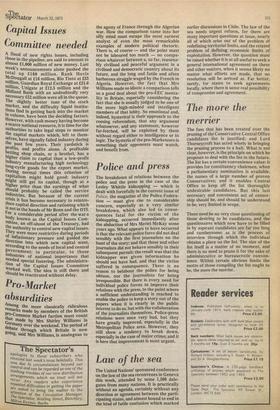Capital Issues Committee needed
A flood of new rights issues, including those in the pipeline, are said to amount to almost £1,000 million of new money. Last week's announcements alone pushed the total up £100 million. Rank Hovis McDougall at £16 million, Rio Tinto at E33 million, Guardian Royal Exchange at £31.6 Unigate at £12.5 million and the Midland Bank with an undoubtedly very necessary £52 million were all in the queue. The slightly better tone of the stock market, and the difficulty liquid institutions find in getting back into the market In volume, have been the deciding factors. However, with cash money having become a scarce national resource, it is time for the authorities to take legal steps to monitor the capital markets which, left to themselves, have signally failed industry during the past few years. Their yardstick is profits, and profits alone. A profitable betting shop chain, or a brothel, has a higher claim to capital than a low-profit industry manufacturing high technology tong-cycle goods for the export market. During normal times this criterion of capitalism might hold good: industry might still get its capital, though at a higher price than the earnings of what .should probably be called the service Industries. But because of the current crisis it has become necessary to reintroduce capital direction and rationing which IS not in the hands of Mr Benn and the DTI. For a considerable period after the war a body known as the Capital Issues Committee, an off-shoot of the Treasury, had the authority to control new capital issues. They were more restrictive during periods OF inflationary pressure and guided the direction into which new capital went, according to the needs of local and central government: in particular, to those industries of national importance that needed special fostering. The administration of the Capital Issues Committee worked well. The idea is still there and should be reactivated without delay.


































 Previous page
Previous page